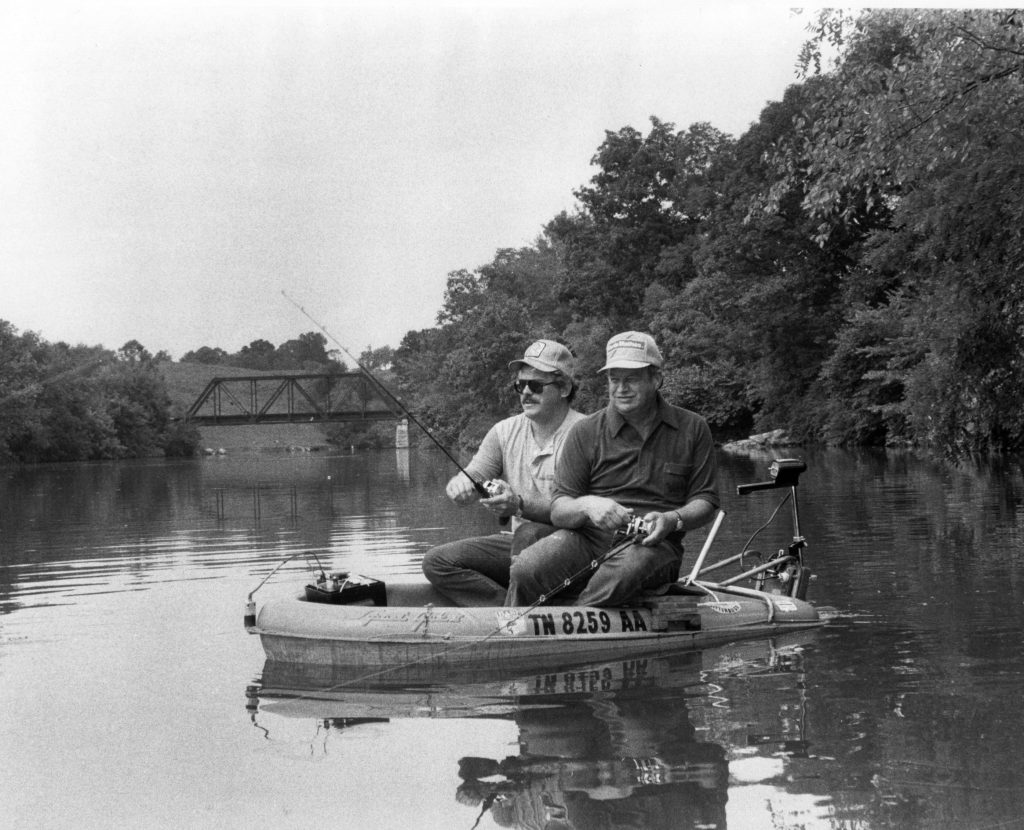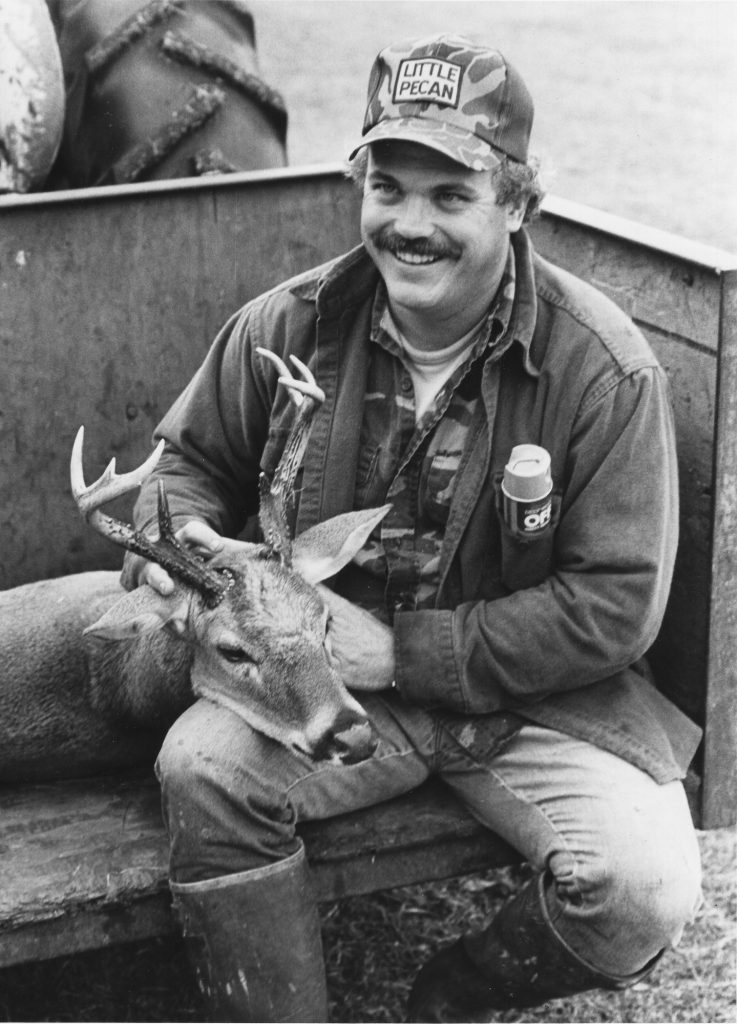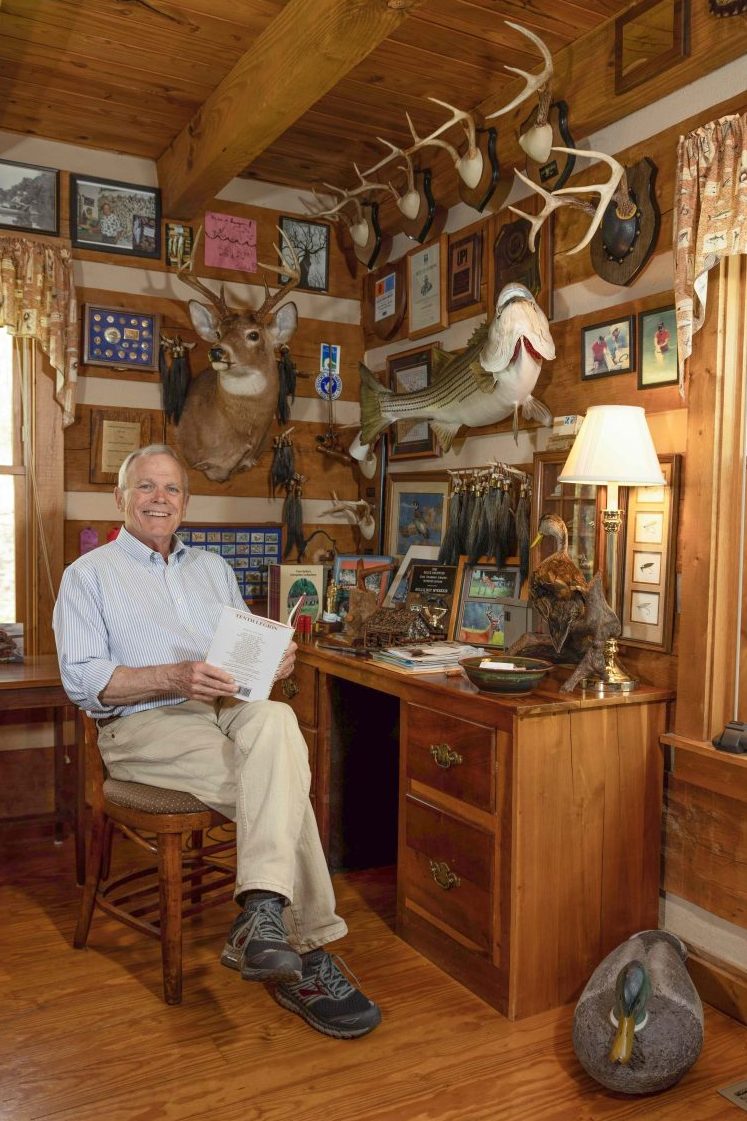He later had to take a writing lab, which he eventually passed, while also writing for the old Knoxville Journal. But I can’t get past hearing him say his “ego was crushed,” as Sam is not a man of ego. He would most certainly give of his time to any person around him. In fact, similarly to the way my dad took Sam under his wing and taught him to fish, Sam turned around and did the same for me. I was just 13 at the time; Sam was 30.
Here I was, a mere pre-teen, along for the ride with cousin Sam and Jody McKenry, the legends of Prater Flatts. I felt so jubilant being with them. By that point, Sam was doing buckets of articles in the field and had written extensively for Waterfowlers World. I can remember one hunt in particular, and I remind Sam of how much I treasured that memory.
There we were in Prater Flatts. I had never been on a duck hunt before. The three of us were in a blind that could have only been about four feet wide. And when the ducks came in, feet down, wings set, Sam said, “Take-em.” In the blink of an eye, Sam and Jody were already out, and before I could even get my gun to my shoulder, a mallard splashed in the decoys. I didn’t realize how quick it was. I can remember I didn’t even shoot that first time, mainly because I simply didn’t know what to do just yet. But I was completely snake-bitten about duck hunting from that day on, and I could not wait for Sam’s next call to hunt. I was in heaven with these guys, and I’ve never once forget that feeling. Sam instilled in me a love of the outdoor life simply by being willing to share his time out there with me.
This duck hunt eventually led to my love of deer hunting—and afterwards, turkey hunting. “It went from Frank Jr.’s generation to me fishing to you hunting. I mean it just stair-stepped like that,” Sam says.

“And then there was brother Andy,” we both say together. Yes, my brother Andy and his best friend, Andy Collins, now a TWRA lieutenant of Region 4, District 41. The tradition of teaching the next generation continued as I turned around and started taking the Andys along with me on hunts. I was right around the same age Sam was when he took me. My brother is now a much better fisherman than I and it gives me joy to have paid forward what Sam taught me.
This is precisely how knowledge of these sports is passed down. And the conversations had in the blinds are nothing short of glorious. You sit there, literally shoulder to shoulder in a very enclosed area, killing time by recanting tales, some embellished a bit, until something happens. It was a time of white bread and bologna sandwiches and fixing broken shear pins with sections of coat hangers. No one complained, and everyone pitched in no matter what the situation. Those are some of my favorite moments, listening to those around you tell their stories. This is when close relationships are made and character is molded. As Sam says, “That’s 90 percent of duck hunting.”
Sam and I sit and swap stories of our memorable moments in the field while Nathan attentively takes notes. And I can’t help but recall one of my absolute favorites with him. “The time we got the truck stuck,” I say to him. I barely finish the sentence, and Sam groans, his face makes it clear he knows exactly what I’m referring to, a day we will undoubtedly never forget and perhaps one he would rather I not tell here, but what the heck, it’s all in good fun right?
It was about 12 years ago on New Years morning, and Sam and I went duck hunting out at the Harrison farm where we’d been countless times. Sam drove his truck that day. I remind him I am to this day grateful it was his and not mine. He laughs.
If you haven’t heard the story (Sam once wrote about this in a column of his), it was the first day of the year and the Harrisons had cleaned out all the feed lots and filled in the swales and pot holes all over the farm with cow manure. We arrived in Sam’s truck around 6 a.m. in the pitch black, like we’d done hundreds of times before, and headed toward the pond, which was flooded with timber and ducks. Sam and I drove excitedly through what looked like a level field.
However, this was not as level of a field as we thought; there was a deep swale, a ditch by another term, that had just been filled in with manure. Sam’s truck bore down into that swale, and we just stopped, up to our ears in steaming cow poop. Engaging the four-wheel drive was a joke. Nothing. “I mean, we just burrowed more and more and more,” he says laughing. “And one of us made the critical error of opening the door.” The smell was obvious and overwhelming as it flowed into the cab. We knew at once we were in deep shit.
“That was me,” Sam says with a laugh. “I forced it open.”
The name of the article Sam wrote was “Drowning in a Sea of Brown Cow.” I remember it plain as day. I had to literally roll down the window and crawl out. Sam, too. And we couldn’t shut his door. Manure was all inside of the truck. It was the first time I’d ever seen Sam Venable upset. He is by far one of the most fun and enjoyable people to be with, one might say unflappable. But this day he was flapping mad. And I can’t say I blame him. As we sat there dumbfounded by the situation we were in, I said, “Sam, there’s the pond, it’s within easy walking distance, maybe a few hundred yards away. There is nothing we can do with the truck until farmer Harrison can pull us out with the tractor later. Let’s just go ahead and hunt.”
We grabbed our stuff, Sam engulfed in silence, and as we walked to the pond, he kept looking back at his truck with the doors open and the sea of brown filling the cab. I just couldn’t resist, “Hey, did you lock it?” I asked and then laughed till tears literally filled my eyes. The look on Sam’s face was meant to silence my laughter but to no avail—it was the funniest thing I have ever seen. Sam remained quiet. “That’s not real funny,” he finally responded. That was the first time, and as far as I know the last time, he’d lost his sense of humor in a situation like that, but it didn’t last long. We went on to have a great hunt.

Farmer Harrison was quite amused as well. He brought the tractor and pulled us out. It was so bad we had to drive back home with the windows rolled down, sticking our heads out like dogs. We brought the truck to my house, and I worked on it for hours attempting to clean it and get the smell out. Afterwards Sam did the same, for months, but to no avail. So Sam wrote a humorous column about drowning in a sea of brown. A reader who owned a detailing company reached out to Sam after reading the column and offered to help. “That thing was immaculate,” Sam says, of when the truck returned. “That was probably the ultimate duck hunt story. And we killed four ducks that morning.”
Every man that takes a young man out hunting or fishing eventually has a story to tell about the ones they teach. And I’m curious at this point to flip the table and hear Sam’s recounting of a tale about me.
“I remember, it was not long after you started hunting. Jody and I were down there on Prater Flatts, and you were hunting with him. And I don’t know if you had torn your hip boots or stepped in the water too deep or whatever, but you had your hip boots off and you had on your sock feet. And you were walking around in that mud in your sock feet. And I said something like, ‘Frank, are you not freezing?’ You said, ‘No, I’m fine.’ And I thought, ‘Boy’s gone and lost it for sure.”
It’s so interesting that such a small detail sticks with Sam. These are stories that build character, that I use when things get tough in my life or when things get tough at work. I think about walking around that mud flat out there in Prater Flatts barefoot without any waders on, and I think to myself, If I can get through that, I can get through anything. Out in the wild, you know how to shoot and be safe with a gun. You know how to stay warm. You know how to survive. It builds resilience, self-confidence, bravery. Even today when I am fishing and I see a drake mallard fly past, the ol’ green head reminds me of what I really am and what’s really important in life. It’s how I relax and get away from it all. And I have Sam to ultimately thank for that.
His love of the outdoors and the lessons learned along the way eventually became part of Sam’s work life when he became the official outdoor writer for Knoxville’s News Sentinel. “After I graduated, we moved to Chattanooga, and I worked for a paper down there. I hadn’t been down there a full year and I get a letter from Tom Siler, who was a sports editor at the Sentinel. He knew my background in wildlife and forestry and journalism. And his letter said, ‘If you come home at Christmas, give me a call.’”
And so he did. They hired him that March. “I was right back up here in my own hometown, doing what I love to do: writing full time about the outdoors. I did that for 15 years.”

This eventually led to his life as an author. “The first book I wrote was actually a book commissioned by a guy in Louisiana. He had a private wildlife management area down there. I’d written for Waterfowler’s World. I wrote some for Ducks Unlimited and all that. So I was building an audience in waterfowl stories. Ralph McDonald, who was a wildlife artist, was invited by this man, whose name was Herman Taylor and lived in Nantucket, Louisiana. He had a place called Little Pecan Island and Cameron Parish on the coast. And Ralph and his general manager, Larry Richardson—he was a good friend of mine—went down there, and he commissioned Ralph to do two originals. And in the course of things he mentioned he wanted to get a book written about that place. And he said, ‘I want somebody young and who knows waterfowl’. And Larry had hunted with me up here, and he said, ‘Well, I’ve got a friend in Knoxville and he might do that.’
“When they got back to Middle Tennessee, Larry contacted me and said, ‘Alright, this guy, he knows your name now.’ And I sat down and wrote him a letter and I thought, That’s a stupidest thing I’ve ever done. Who is this guy? He doesn’t know me. But I said I’d be interested in talking to him. About a week later, he called me, ‘Come down and hunt with me.’ I flew down there. We talked it over and a couple of months later signed a contract. And I worked for that man off and on for 10 years. I wrote the book. I did all their speeches, all their dog and pony shows, they had a lot of corporate entertainment down there. And I was in and out of that place, essentially, for 10 winters. I took all my vacation time and would go down there. And that’s how I got my first book.”
Sam would eventually go on to write more than a dozen books, but if you ask him if he has a favorite, while his first book was surely a memorable one, the answer is not so simple. “It’s just like a column. The best one you ever wrote is the one you just finished, when you’re done with it. And the worst thing is facing the next one,” he says. “I’m being facetious, writing is work. But if you like to write, it’s fun work.”
After 15 years writing about outdoors, it was time for a change at the News Sentinel for Sam. “As I jokingly said, you can only cover opening day of trout season so many times before it’s just repetition,” he says. As Carson Brewer, the News Sentinel’s long-standing columnist, was about to retire, Sam, with his humor-filled sports stories, was approached about taking over as the columnist.
“I write a serious column on occasion, but I always laugh and say, when I get a serious thought, I run and try to take a cold shower and get out of the mood real quick,” he says. “There’s some topics you just have to be serious about, but I think it’s just like that old saying, you attract more flies with sugar than with vinegar. And you can get more people reading you if you take a subject that’s in the news and treat it with humor.”
Sam and I are cut from the same cloth, created from the same blood, but bonded through the traditions of the outdoors. Sam’s found a way in his life as a journalist to bring this tradition alive in the pages people read every day. For those who hunt and fish, his works have helped them see that the pastimes they love are alive and well in our region. For those who don’t, he’s opened doors for them to perhaps one day explore them for the first time. Through his books he’s brought his humor to larger audiences and put East Tennessee on the map as a place to hunt and fish, but also as a place filled with good people and exceptional camaraderie.
Sam points out that while outdoor traditions might not focus on hunting and fishing for everyone, parents are still finding ways to share their outdoor passions with their kids.
And I’m willing to bet, that through his writing, he might just have played a mentor type role in the lives of hundreds of his readers, inspiring them to get outside, pick up a gun or a rod and start a tradition.

Comments are closed.